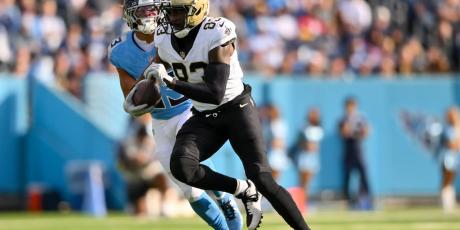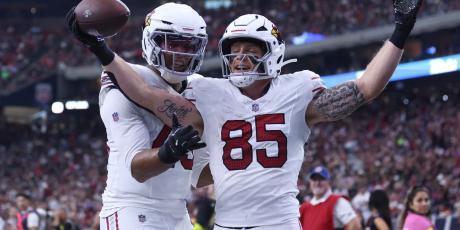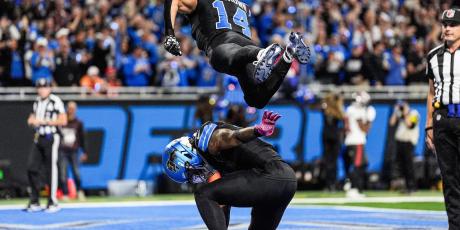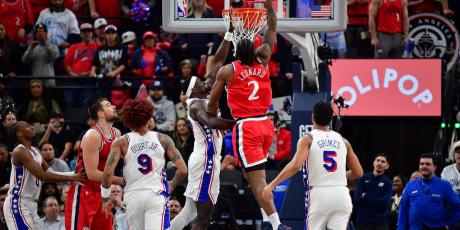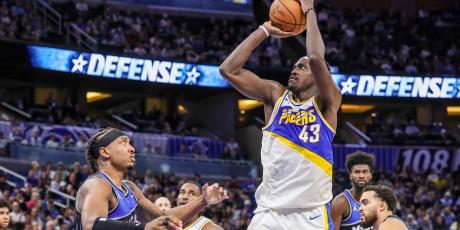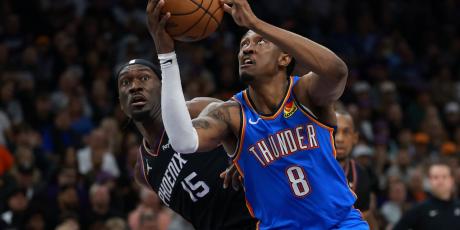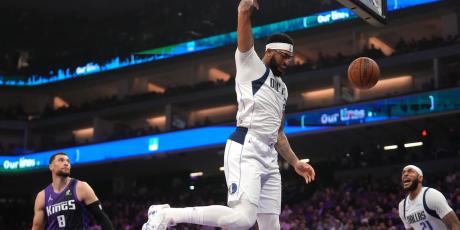Raybon's Review: DFS Lessons Learned in Week 11

Analyzing last week's results is one of the best investments of time you can make as a DFS player. Here I analyze winning lineups, low-owned players, and other notable Week 11 takeaways that can be used to gain an edge going forward.
Note: This article is normally part of 4for4's premium DFS subscriber content but is free to all this week. Happy Thanksgiving!
DraftKings Week 11 Millionaire Maker Winning Lineup
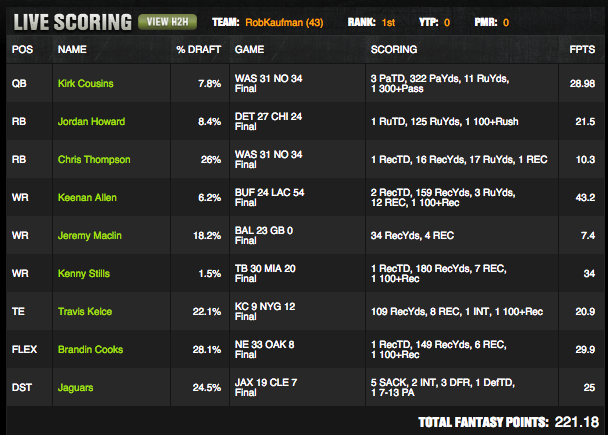
RobKaufman took down the Week 11 Millionaire Maker by using a QB-RB stack (if you're not keen on these yet, get familiar), using a WR in the FLEX, paying up at TE and DST, and mixing in a few low-owned plays with the chalk. Thompson had the highest GPP odds of any RB under $7,500. Maclin was tops among WRs under $5,000 in GPP odds, and though he put up a dud, it ended up making the rest of the lineup work—though stacking Jamison Crowder would have cost $200 less and provided an extra few points of breathing room. Cooks was seventh among WRs on the slate in GPP odds, while Travis Kelce and the Jaguars were both first at their respective positions. All five of the aforementioned players were recommended in our Week 11 DraftKings slate breakdown.
If you were among the 92.2% that didn't own Kirk Cousins, how could you have landed on him?
Cousins had the third-highest GPP odds on the slate and was playing in a game with a total over 50. Washington's road underdog status kept Cousins' ownership in check (though it was a bit higher here than the 1–5% we projected), but low projected ownership meant Cousins owned he second-highest GPP leverage score among QBs priced $5,000 and above, and the highest among QBs priced $6,000 or more.
If you were among the 91.6% that didn't own Jordan Howard, how could you have landed on him?
Howard ended up being a play I posted an update to my DraftKings slate breakdown to recommend. Here's what I wrote:
One other mid-range play to consider—especially because his ownership will be lowered after last week's dud at high ownership—is Jordan Howard ($6,200). Howard will get key run blocker Kyle Long back on the offensive line, while the Lions are weakened without Ezekiel Ansah (and Haloti Ngata).
This was a classic example of how paying attention to overlooked injuries can pay off, as well as an example of how going against public recency bias can pay off.
If you were among the 98.5% that didn't own Kenny Stills, how could you have landed on him?
Schedule-adjusted fantasy points allowed was the strongest signal a big game might be in the cards, as the Bucs ranked dead least in WR aFPA. Stills did have a GPP Leverage Score over 1.0, but there was even more hidden leverage given the fact that Jarvis Landry and DeVante Parker projected to be fairly high-owned.
If you were among the 93.8% that didn't own Keenan Allen, how could you have landed on him?
Allen is a classic example of a player going overlooked because nothing particularly stands out about the matchup on paper (the Bills were 11th in WR aFPA coming into the game). That's where GPP leverage scores come in, as Allen's score of 1.85 indicated he was projected to be owned in a lower percentage of lineups than his probability of hitting value would otherwise suggest. In fact, of the five WRs in the $5,000–$5,900 range with GPP leverage scores of 1.85 or higher, four—Demaryius Thomas, Davante Adams, Marvin Jones, and Allen—all posted at least 17.4 DraftKings points.
FanDuel Week 11 Sunday Million Winning Lineup
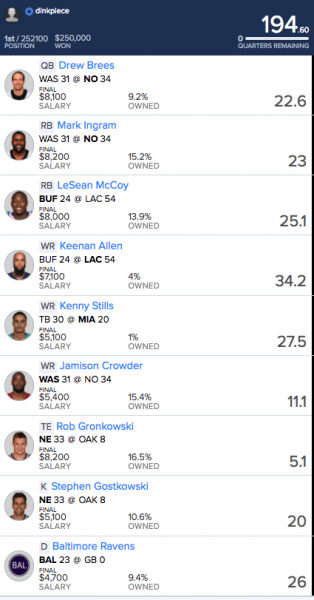
Congrats to dinkpiece for taking down the Week 11 Sunday Million! I got the chance to meet him at the FSTA conference in New York City a few years back, and he's a great dude (and, I think, an avid Marquess Wilson fan, for good reason). Interestingly enough, dinkpiece took down the Sunday Million with the opposing QB-RB stack of the one in the winning Millionaire Maker Lineup over on DraftKings. (Again, if you don't have this kind of stack in your repertoire, you should; I discuss it in more depth in research I published on stacking on FanDuel last season.)
The QB-RB pairing of Drew Brees and Mark Ingram (who has been in the winning Sunday Million lineup for two straight weeks after Alvin Kamara appeared in it the week before that) was technically a game stack that also included Jamison Crowder. Brees was ranked fourth among QBs in GPP odds, and was the only one among the top four who also had a GPP leverage score above 1.0. Mark Ingram was sixth among RBs in GPP odds. We actually expected Ingram to be higher owned than Kamara (22.9%) thanks to his 3-TD outburst the previous week, but in this tournament at least, a larger percentage of the field took the $700 savings with Kamara. Crowder had the highest GPP odds among WRs under $6,000.
Moving outside the Saints-Redskins game stack, Stephen Gostkowski was tied for first among kickers in GPP odds, and the Jaguars were in lone possession of the top GPP odds among DSTs. Rob Gronkowski was second among TEs in GPP odds, and though he didn't hit, there's nothing inherently wrong with stacking a TE and kicker, as the two positions are positively correlated in terms of FanDuel points.
Other Takeaways
On a recent GM Street podcast, former NFL general manager Michael Lombardi explained that winning in November comes down to being able to execute your plays despite the other team knowing what’s coming—a corollary of teams being in evaluation mode over the first part of the season. This is important as it relates to DFS, because this is the time of the year when it's easy to fall in the trap of putting too much weight on full-season results because we finally have what feels like a large enough sample size. However, there's no one-size-fits-all sample size; generally, the larger the better—except for QB—but there will always be exceptions, and the better you can determine the validity of trends that pop up, the better you will be as a DFS player. With that in mind, let's take a look at some trends that have emerged in October and November that will have DFS implications moving forward.
Since Week 6, neither Alex Smith nor Kareem Hunt have been a top-12 option at his respective position
By now, you've probably seen the contrasting splits of Alex Smith and Kareem Hunt between their 5–0 start and 1–4 slide:
Drop-off for Alex Smith and Kareem Hunt between 5-0 start and 1-4 slide:
Smith (5-0): 8.9 YPA, 77.1% cmp, 11/0 TD:INT
Smith (1-4): 7.3 YPA, 62.9% cmp, 7/3 TD:INT
Hunt (5-0): 97 car, 628 yd, 6.3 YPC, 4 TD
Hunt (1-4): 76 car, 264 yd, 3.5 YPC, 0 TD— Chris Raybon (@ChrisRaybon) November 20, 2017
In terms of fantasy points per game, Smith is tied for 14th on DraftKings (17.5) and ranks 15th on FanDuel (16.7), while Hunt sits 21st on DraftKings (12.5) and 22nd on FanDuel (10.6) among RBs.
So what exactly is going on? Andy Reid's offensive play-calling—particularly pre-snap motions involving deception as to whether Tyreek Hill would touch the ball—gave defense fits early in the season. Or more precisely, they gave defenses playing man coverage fits. The Chiefs' offensive issues began when they played the Steelers—the league's most zone-heavy team—in Week 6, with the Steelers defensive performance providing a blueprint of sorts. Before the Giants game, Demarcus Robinson admitted the offense knows what defenses are doing differently, implying that they just haven't been able to beat it. After the game, Travis Kelce flat out admitted they can't beat cover 2. Because defenses have cracked the code on curtailing Kansas City's passing game, they've been able to prioritize stopping the run as well.
In a nutshell, those are the Chiefs' issues from a real football standpoint, but what are the DFS implications?
Whereas the easy narrative to point to with Hunt's disappointing DFS performances over the past month and a half are due to ceding passing-down work to Charcandrick West, volume hasn't exactly been the issue with Hunt: he's handling 19.0 touches per game, including 3.8 receptions, over the team's 1–4 slide. The bigger issue is Hunt hasn't gotten the ball in the money zone: of the 12 plays the Chiefs have run inside the 10-yard line during the skid, Hunt's number has been called just three times. This was an issue for Chiefs running backs last season as well, as Spencer Ware finished with just a 43.2% share of the team's carries inside the 10. It's a big reason the Chiefs backfield hasn't been as much of a fantasy goldmine post-Jamaal Charles—something I pointed out in the preseason:
#Chiefs total running back PPR points ranking:
2014: 4th (Jamaal Charles' last full season)
2015: 22nd
2016: 25th— Chris Raybon (@ChrisRaybon) August 26, 2017
In fact, Hunt's numbers during the skid look very similar to Ware's full-season numbers last year:
Over last 5 games, Hunt's numbers (19.0 touches, 86.6 total yards, 0.0 TD) starting to resemble Spencer Ware's from 2016 (17.7 touches, 97.5 total yards, 0.36 TD). https://t.co/zWOwQHqAcM
— Chris Raybon (@ChrisRaybon) November 20, 2017
For reference, Ware's salary peaked at $7,700 on FanDuel and $6,800 on DraftKings. Hunt is better than Ware—Hunt had 3 TDs of 50+ yards after three weeks while Ware has never had even a 20-yarder in his career—but given that long TDs are difficult for a player to repeat and difficult for us to predict, Hunt will also be overpriced on DraftKings until his $8,000 salary drops into the low $7,000s. His $7,700 salary on FanDuel falls in line with Ware's peak, but you'd like to see a bigger discount for a back with limited involvement in the red zone. Complicating matters is that despite the lack of involvement in scoring position, Hunt has been extremely unlucky as well. No back—especially not one as good as Hunt—should be expected to go 152 touches without a TD, as Hunt has done over his past seven games. All in all, I think the best way to treat the situation is to proceed with caution in cash games, but continue to fire him up in tournaments due to likely regression.
As far as Smith, it's dicier. It's entirely possible that the five-game stretch where everything was working for Smith was largely a product of Reid's play-calling catching defenses off guard, and that Smith is still who we thought he was—numbers-wise, at least. If that's the case, then Smith is even more overpriced than Hunt. Over the past two seasons, Smith's salary rarely climbed above the $7,000 mark on FanDuel or the low $5,000s on DraftKings, but this season he's been in the upper $7,000s on FanDuel and in the mid-$6,000s on DraftKings since Week 4. In hindsight, we probably should have been in wait-and-see mode with Smith ever since the Pittsburgh defeat—the only game he's hit the 20-point mark on FanDuel or DraftKings since has been against the Raiders, who are yet to intercept a pass and generally play poor pass defense.
Since Week 6, Mark Ingram and Alvin Kamara are the two highest-scoring RBs in fantasy
The Saints' running game is a perfect example of what Lombardi talked about: other teams know it's coming—New Orleans actually ran 24 straight times in Week 10 against Buffalo—but can't stop it. In DFS, the numbers tell us to favor players with a high percentage share of their team's volume, but Ingram and Kamara have bucked that trend while the Saints backfield has handily outscored every other backfield in the league by over 6 points per game on DraftKings and over 5 points per game on FanDuel. With their salaries now in the upper echelon, though, how should we proceed going forward?
As much as it pains me to say, because of how good he's been, Kamara's numbers are the more likely of the two to regress. Ingram averages 22.0 touches per game to Kamara's 14.0 since Adrian Peterson was traded, and Ingram has handled 11 of the team's 25 plays inside the opponent's 10-yard line over that span to Kamara's 6. Ingram also has further to fall from his league-leading 6.4 yards per carry than Ingram does from his still very good 5.2. Keep in mind, these are the two highest-scoring backs in fantasy we're talking about, so I don't think this should effect GPP exposure as much, but in cash games, Ingram's larger workload gives him more built-in safety
Adam Thielen has been the most targeted player in football since Week 6 (11.2 targets per game)
Especially at WR, emerging stars can trip us up in DFS because we see their salary continue to rise and naturally brace for regression to whatever set point we had in our minds for their value. But Thielen's production matches his volume: he's second only to Antonio Brown in DraftKings points per game since Week 6, and behind only Brown and DeAndre Hopkins on FanDuel over that span—and he beat Josh Norman numerous times two weeks ago to boot. As the only player in the league with 5 or more catches in every game this season, Thielen has actually been posting the type of consistency we have come to expect from Brown. It's worth noting Thielen's target numbers are a bit inflated because he averaged 12.5 targets per game in the two games Stefon Diggs missed and 8.9 in the eight games Diggs has been on the field. However, in a trend that goes back to last season, Thielen is actually more productive with Diggs in the lineup, averaging 97.4 yards and 0.38 TDs with Diggs in the lineup this season, compared to 69.0 yards and no TDs with Diggs out. It's also worth noting that starting at a sample size of roughly five games, a WR's past production is more predictive of future production than past volume, and Thielen ranks in the top five in points per game on both sites.
Since the Seahawks' bye in Week 6, Russell Wilson is the fantasy QB1 by over 5 points per game
From Week 7 on, Wilson is averaging 28.7 points per game on DraftKings while no other QB averages more than 22.7 and 27.5 points per game on FanDuel while no other QB is better than 22.2. You may have heard me call Wilson the new Aaron Rodgers of fantasy in a few different podcasts that season, and the numbers, especially post-bye, show the comparison is apt. The Seahawks have morphed into a pass-heavy team where Wilson is their offense. In five games pre-bye, Seattle passed the ball on 58.2% of their offensive plays and Wilson dropped back to pass or rushed the ball on 67.4% of the team's plays. In five games since, Seattle's pass rate is up to 62.7% and Wilson has accounted for 70.7% of the team's plays. Wilson is also going downfield more: his average pass attempt traveled 9.5 yards per attempt pre-bye, but has traveled 11.1 yards per attempt post-bye. Especially with the quality Seattle's once-vaunted defense compromised by injuries to Richard Sherman and Kam Chancellor, among others. Wilson may be able to fend off regression for the rest of the season (save for a tough matchup in Jacksonville in Week 14).

